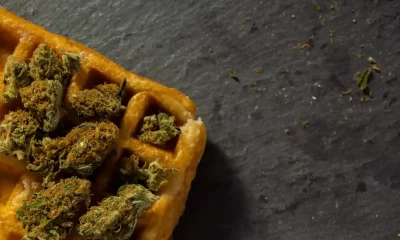Business
Inspections of Washington, D.C. ‘Gifting’ Shops Put on Pause

The delay has added more confusion to Washington D.C.’s under-the-table businesses.
Planned inspections of Washington, D.C.’s unlicensed cannabis retailers have reportedly been delayed.
The inspections, which were announced last month by the city’s Alcoholic Beverage Regulation Administration, were designed to ensure the businesses “abide by the regulatory requirements of DC Health, the Department of Consumer and Regulatory Affairs (DCRA), the District of Columbia Fire and Emergency Medical Services Department (FEMS), and the Office of Tax and Revenue (OTR).”The inspections, which were announced last month by the city’s Alcoholic Beverage Regulation Administration, were designed to ensure the businesses “abide by the regulatory requirements of DC Health, the Department of Consumer and Regulatory Affairs (DCRA), the District of Columbia Fire and Emergency Medical Services Department (FEMS), and the Office of Tax and Revenue (OTR).”
But the DCist reports that officials are “delaying plans to inspect the city’s many marijuana gifting stores this week, deepening the confusion around the maybe-legal, maybe-not industry that continues to grow across the city.”
The outlet, citing a source familiar with the situation, said that law enforcement officials “had raised concerns about the protocol for inspecting the stores, and what would happen if inspectors found weapons or other illicit items.”
The inspections were scheduled to begin after Labor Day.
Voters in the nation’s capital approved a ballot initiative in 2014 that legalized recreational cannabis, but due to an arcane provision that gives Congress oversight over its laws, the sale of pot remains prohibited in D.C.
Since that vote eight years ago, every appropriations bill passed by Congress has contained what is known as the “Harris Rider,” named Maryland Republican Congressman Andy Harris, which prohibits Washington, D.C. from commercializing recreational cannabis.
Democrats on Capitol Hill flirted with the idea of removing the Harris Rider from the latest spending bill when it released a draft of the legislation last fall.
But by March of this year, the final version of the bill included the Harris Rider, much to the chagrin of cannabis reform advocates in D.C.
“Congress needs to step out of this,” Phil Mendelson, the chair of the D.C. City Council, said in March. “It perpetuates the current lawless situation in the city.”
That has not stopped a number of intrepid business owners in Washington, D.C. from finding a workaround to the ban.
The city has a number of illicit retailers that sell cannabis through the practice of “gifting,” through which a customer pays for an item such as a t-shirt, and is in turn provided with a “gift” of cannabis.
Gifting has become so ubiquitous––and popular––in Washington, D.C. that some policymakers and industry officials have expressed concerns that it is chewing into the margins of legal, medical cannabis operations, with patients opting to go the illicit route instead of filling out tedious paperwork.
“The medical side are struggling on the brink of existence, while the illegal side has only grown more rapidly,” Mendelson said in April.
That month, the D.C. Council rejected a proposal that would have imposed harsh fines on “gifting” retailers.
A couple months later, the council passed a different measure that was also proposed with an eye toward buttressing the city’s beleaguered medical cannabis retailers. Under the new ordinance, which was signed into law by Washington, D.C. Mayor Muriel Bowser in July, medical cannabis patients in the city are now allowed to “self-certify” their qualifications for the treatment, which will enable them to bypass a doctor.
“We have made it a priority over the years to build a more patient-centric medical marijuana program and this legislation builds on those efforts,” Bowser said in a statement. “We know that by bringing more medical marijuana patients into the legal marketplace in a timely manner and doing more to level the playing field for licensed medical marijuana providers, we can protect residents, support local businesses, and provide clarity to the community.”
Source: https://hightimes.com/news/inspections-of-washington-d-c-gifting-shops-put-on-pause/
Business
New Mexico cannabis operator fined, loses license for alleged BioTrack fraud

New Mexico regulators fined a cannabis operator nearly $300,000 and revoked its license after the company allegedly created fake reports in the state’s traceability software.
The New Mexico Cannabis Control Division (CCD) accused marijuana manufacturer and retailer Golden Roots of 11 violations, according to Albuquerque Business First.
Golden Roots operates the The Cannabis Revolution Dispensary.
The majority of the violations are related to the Albuquerque company’s improper use of BioTrack, which has been New Mexico’s track-and-trace vendor since 2015.
The CCD alleges Golden Roots reported marijuana production only two months after it had received its vertically integrated license, according to Albuquerque Business First.
Because cannabis takes longer than two months to be cultivated, the CCD was suspicious of the report.
After inspecting the company’s premises, the CCD alleged Golden Roots reported cultivation, transportation and sales in BioTrack but wasn’t able to provide officers who inspected the site evidence that the operator was cultivating cannabis.
In April, the CCD revoked Golden Roots’ license and issued a $10,000 fine, according to the news outlet.
The company requested a hearing, which the regulator scheduled for Sept. 1.
At the hearing, the CCD testified that the company’s dried-cannabis weights in BioTrack were suspicious because they didn’t seem to accurately reflect how much weight marijuana loses as it dries.
Company employees also poorly accounted for why they were making adjustments in the system of up to 24 pounds of cannabis, making comments such as “bad” or “mistake” in the software, Albuquerque Business First reported.
Golden Roots was fined $298,972.05 – the amount regulators allege the company made selling products that weren’t properly accounted for in BioTrack.
The CCD has been cracking down on cannabis operators accused of selling products procured from out-of-state or not grown legally:
- Regulators alleged in August that Albuquerque dispensary Sawmill Sweet Leaf sold out-of-state products and didn’t have a license for extraction.
- Paradise Exotics Distro lost its license in July after regulators alleged the company sold products made in California.
Golden Roots was the first alleged rulebreaker in New Mexico to be asked to pay a large fine.
Source: https://mjbizdaily.com/new-mexico-cannabis-operator-fined-loses-license-for-alleged-biotrack-fraud/
Business
Marijuana companies suing US attorney general in federal prohibition challenge

Four marijuana companies, including a multistate operator, have filed a lawsuit against U.S. Attorney General Merrick Garland in which they allege the federal MJ prohibition under the Controlled Substances Act is no longer constitutional.
According to the complaint, filed Thursday in U.S. District Court in Massachusetts, retailer Canna Provisions, Treevit delivery service CEO Gyasi Sellers, cultivator Wiseacre Farm and MSO Verano Holdings Corp. are all harmed by “the federal government’s unconstitutional ban on cultivating, manufacturing, distributing, or possessing intrastate marijuana.”
Verano is headquartered in Chicago but has operations in Massachusetts; the other three operators are based in Massachusetts.
The lawsuit seeks a ruling that the “Controlled Substances Act is unconstitutional as applied to the intrastate cultivation, manufacture, possession, and distribution of marijuana pursuant to state law.”
The companies want the case to go before the U.S. Supreme Court.
They hired prominent law firm Boies Schiller Flexner to represent them.
The New York-based firm’s principal is David Boies, whose former clients include Microsoft, former presidential candidate Al Gore and Elizabeth Holmes’ disgraced startup Theranos.
Similar challenges to the federal Controlled Substances Act (CSA) have failed.
One such challenge led to a landmark Supreme Court decision in 2005.
In Gonzalez vs. Raich, the highest court in the United States ruled in a 6-3 decision that the commerce clause of the U.S. Constitution gave Congress the power to outlaw marijuana federally, even though state laws allow the cultivation and sale of cannabis.
In the 18 years since that ruling, 23 states and the District of Columbia have legalized adult-use marijuana and the federal government has allowed a multibillion-dollar cannabis industry to thrive.
Since both Congress and the U.S. Department of Justice, currently headed by Garland, have declined to intervene in state-licensed marijuana markets, the key facts that led to the Supreme Court’s 2005 ruling “no longer apply,” Boies said in a statement Thursday.
“The Supreme Court has since made clear that the federal government lacks the authority to regulate purely intrastate commerce,” Boies said.
“Moreover, the facts on which those precedents are based are no longer true.”
Verano President Darren Weiss said in a statement the company is “prepared to bring this case all the way to the Supreme Court in order to align federal law with how Congress has acted for years.”
While the Biden administration’s push to reschedule marijuana would help solve marijuana operators’ federal tax woes, neither rescheduling nor modest Congressional reforms such as the SAFER Banking Act “solve the fundamental issue,” Weiss added.
“The application of the CSA to lawful state-run cannabis business is an unconstitutional overreach on state sovereignty that has led to decades of harm, failed businesses, lost jobs, and unsafe working conditions.”
Business
Alabama to make another attempt Dec. 1 to award medical cannabis licenses

Alabama regulators are targeting Dec. 1 to award the first batch of medical cannabis business licenses after the agency’s first two attempts were scrapped because of scoring errors and litigation.
The first licenses will be awarded to individual cultivators, delivery providers, processors, dispensaries and state testing labs, according to the Alabama Medical Cannabis Commission (AMCC).
Then, on Dec. 12, the AMCC will award licenses for vertically integrated operations, a designation set primarily for multistate operators.
Licenses are expected to be handed out 28 days after they have been awarded, so MMJ production could begin in early January, according to the Alabama Daily News.
That means MMJ products could be available for patients around early March, an AMCC spokesperson told the media outlet.
Regulators initially awarded 21 business licenses in June, only to void them after applicants alleged inconsistencies with how the applications were scored.
Then, in August, the state awarded 24 different licenses – 19 went to June recipients – only to reverse themselves again and scratch those licenses after spurned applicants filed lawsuits.
A state judge dismissed a lawsuit filed by Chicago-based MSO Verano Holdings Corp., but another lawsuit is pending.
Source: https://mjbizdaily.com/alabama-plans-to-award-medical-cannabis-licenses-dec-1/
-

 Business2 years ago
Business2 years agoPot Odor Does Not Justify Probable Cause for Vehicle Searches, Minnesota Court Affirms
-

 Business2 years ago
Business2 years agoNew Mexico cannabis operator fined, loses license for alleged BioTrack fraud
-

 Business2 years ago
Business2 years agoAlabama to make another attempt Dec. 1 to award medical cannabis licenses
-

 Business2 years ago
Business2 years agoWashington State Pays Out $9.4 Million in Refunds Relating to Drug Convictions
-

 Business2 years ago
Business2 years agoMarijuana companies suing US attorney general in federal prohibition challenge
-

 Business2 years ago
Business2 years agoLegal Marijuana Handed A Nothing Burger From NY State
-

 Business2 years ago
Business2 years agoCan Cannabis Help Seasonal Depression
-

 Blogs2 years ago
Blogs2 years agoCannabis Art Is Flourishing On Etsy













